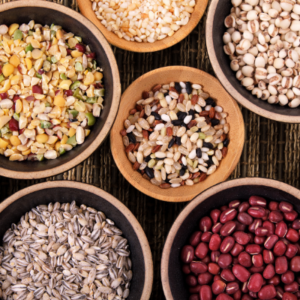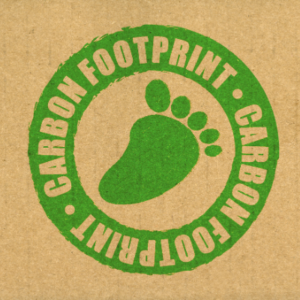The vegan diet involves eating only foods that are made from or come from plants. Vegans do not eat foods that come from animals, including dairy products and eggs. Increasing numbers of people are now following vegan diets due to health, animal welfare and environmental concerns. In fact, research by The Vegan Society showed that the number of vegans in the UK quadrupled between 2006 and 2018.
What is Veganuary?
Veganuary is a 31-day challenge that asks participants to eat only plant-based foods throughout the month of January. The Veganuary campaign began back in 2014 and over one million people have taken part since it started.
Are there any health benefits?
Cutting out meat and dairy products leads you to naturally assume that vegan diets are healthier. But how true is this?
 Improved heart health
Improved heart health
Following a vegan diet can boost heart health in many ways. Animal products, such as meat, cheese and butter are the main dietary sources of saturated fats. Eating foods that contain these fats can raise cholesterol levels which increase the risk of heart disease and stroke. Therefore, a lower intake of animal products and a higher intake of plant-based foods can reduce the risk of heart disease.
Increased dietary fibre is also linked to better heart health with plant-based vegetables and grains being the best sources.
Lower BMI
People on a vegan diet often eat fewer calories than those eating an omnivorous diet due to plant-based products containing a smaller number of calories for the same sized portion. For example, tofu, a common meat supplement for vegans and vegetarians, contains just 79 calories per 100g. Whereas 100g of chicken breast contains 165 calories.
Many animal foods are high in fat and in turn, high in calories. So, replacing these with low calorie plant-based foods can help people to manage their weight.
A moderate caloric intake can lead to a lower body mass index (BMI) and in turn, a reduced risk of obesity which is a major risk factor for heart disease.
Reduced cancer risk
Eating a vegan diet may reduce the risk of cancer by up to 15%, according to a 2017 review. This could be because plant-based foods are high in fibre, vitamins and phytochemicals that protect against cancers.
Cancer Research UK also states that eating lots of processed meat, including ham, bacon, salami and sausages, can cause cancer. Red meat, including fresh, minced and frozen beef, pork and lamb is a probable cause of cancer but a few more studies are required to be certain.
By eliminating red and processed meats from the diet, individuals can remove these possible risks.
Health drawbacks
The vegan diet is generally considered to be higher in fibre and lower in salt than an omnivorous diet. However, it is also considered to be lower in cholesterol, protein and calcium, all of which are essential to our body’s functionality. The NHS advises that with good planning and an understanding of what makes up a healthy, balanced vegan diet, you can get all the nutrients your body needs. However, if you do not plan your diet properly, you could miss out on essential nutrients such as calcium, iron, protein and vitamin B12.
Protein is essential in your diet to help your body repair cells and make new ones and while vegans won’t be getting their protein from meat or dairy products, it can be sourced through seitan, tofu, lentils and most varieties of beans.
The body also needs vitamin B12 to maintain healthy blood and a healthy nervous system, and is found in meat, fish, eggs and dairy. But not in fruit or vegetables.
When eating a vegan diet, it’s important to stay away from nutrient-poor, fast-food vegan options and instead base your diet around nutrient-rich whole plants and fortified foods. Vitamin B12 and other supplements can also be considered.
 What are the environmental benefits?
What are the environmental benefits?
The positive environmental impact of the vegan diet is huge. Here are 5 statistics that we found the most mind-blowing:
- Researchers are the University of Oxford found that cutting meat and dairy products from your diet could reduce an individual’s carbon footprint from food by up to 73%.
(source) - If everyone stopped eating these foods, the global farmland use could be reduced by up t0 75%. That’s an area equivalent to the size of the US, China, Australia and the EU combined.
(source) - Animal agriculture contributes an estimated 18% to total greenhouse gas emissions from the five major sectors for greenhouse gas reporting. For the agriculture sector alone, farmed animals constitute nearly 80% of all emissions.
(source) - If the world went vegan, it could save 8 million human lives by 2050, reduce greenhouse gas emissions by two thirds and lead to healthcare-related savings and avoided climate damages of $1.5 trillion.
(source) - If every family in the UK removed the meat from just one meal a week, it would have the same environmental impact as taking 16 million cars off the road.
(source)
What are the drawbacks of a vegan diet and is it sustainable?
Many of the statistics above are only relevant if everyone on this planet turned vegan, which realistically, isn’t going to happen. Transitioning from an omnivorous diet to a vegan diet also isn’t going to be an easy ride and according to a US study, 70% of those who turn vegan backslide to an omnivorous diet.
There could be a number of reasons for this:
- The diet is very restrictive
- Requires a lot of planning
- Not as readily available in supermarkets, pubs and restaurants
However, the same study also found that 37% of ex-vegetarian/vegans indicated that they would be interested in going back to a no-meat diet at some point in the future.
As the vegan diet doesn’t appear to be particularly sustainable without a lot of time and determination, a YouGov analysis shows that 14% of Brits are now following a ‘flexitarian diet’ instead.
A ‘flexitarian’ is a person who has a primarily vegetarian diet but occasionally eats meat or fish. A BBC article says that this ‘definition in itself is problematic, because “occasionally” could mean once a week, or more, but the premise is to reduce your consumption of animal products.’
The flexitarian diet holds its own benefits – if everyone ate less meat, it would reduce or eliminate the need for intensive animal farming and it’s also a more sustainable, long-term choice.
Why should you take part in Veganuary?
So, now that you know more about the health benefits, environmental impact and long-term sustainability of the vegan diet, why should you consider taking part in Veganuary?
Here are our top 5 reasons:
- It’s good for your health – we’re all looking for a little detox after a Christmas festive binge. A vegan diet is a great way to ensure that you’re eating plenty of micronutrients (found in fruit and vegetables), fibre and minerals.
- It helps our planet – by cutting out animal products for a month you are helping the planet. And you never know, throughout the course of the month your mindset could shift and you may leave January as a ‘flexitarian’ rather than an omnivore!
- Have fun in the kitchen – tired of cooking the same recipes week in week out? Or maybe you never learnt to cook? Now is the time to try something new! Find some recipes online or purchase a new cookbook and enjoy trying out new flavours – you could even discover your new favourite meal. One of the favourite vegan meals amongst the Healthy Performance team is the Ultimate Chilli by BOSH!
- Too much meat is bad for us – from high blood pressure and cholesterol to an increased risk of cancer, eating a diet heavy in meat is not healthy for our bodies.
- According to the Veganuary website, more than 75% of people who have tried going vegan for a month report an improvement in their health. They said they sleep better and lost an average of 6lbs as a result of their changed diet.
For more information on going Vegan and for food inspiration, recipes and supplement ideas you can visit the Veganuary and NHS websites:











